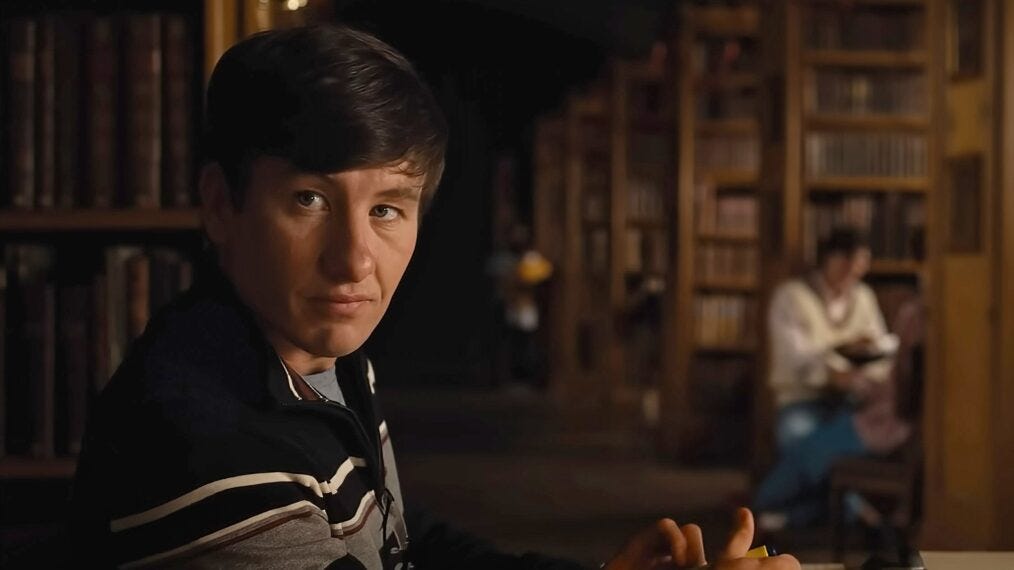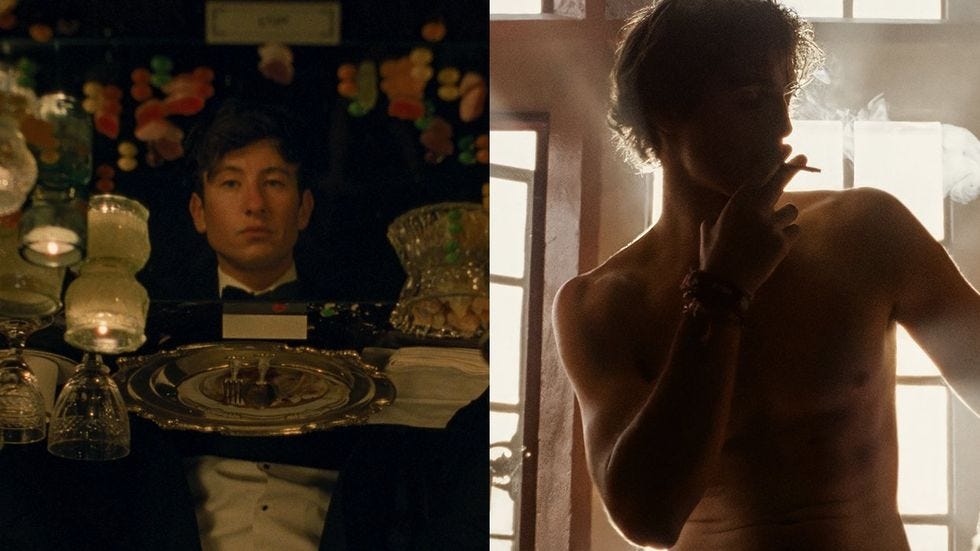Saltburn turned out to be nothing like I had expected. The trailers seemed to advertise a story about an innocent boy who, naive to the trappings of the uber-wealthy, was pulled into their web and morally descended to their level. Something of a Lord of the Flies meets Dorian Grey with a dash of Breaking Bad (I think. I’ve never seen it). It was the first film I was excited to see in a very long time.
Boy, was I so wrong.
Set in the early 2000s, the film follows Oliver Quick (Barry Keoghan), a freshman at Oxford University who manages to befriend Felix Catton (Jacob Elordi), a boy born to generational wealth and comfort and one of the most popular people on campus. At the end of the school year, Felix invites Oliver to his estate, Saltburn, as a respite from his complicated family. It’s here that their relationship grows even further before unraveling in dark, sinister ways.
A Tale of Two Nobodies
Writer and director Emerald Fennell clarifies that Oliver is a nobody desperate to be somebody. We see this in the beginning when, as soon as he walks through those shiny Oxford University gates, he is surrounded by excited wealthy college students. While they eagerly converse outside under a beautiful blue sky, he quietly slinks to his room to observe from afar.
His initial attempts to integrate himself into Oxford society are unsuccessful with most except Michael Gavey, a petulant math whizz who takes his identity of not being one of the cool kids a little too seriously. Although Michael doesn’t get much screen time in the film, his presence harkens back to the teen movie trope of the nerdy outcasts who find fellowship in a world that ignores them. However, it contrasts how they react to their position in the social hierarchy. Michael secretly longs to change it but ultimately accepts his fate and whines about it instead. On the other hand, Oliver does whatever is necessary to climb to the top.
When Felix’s friend group rejects Oliver due to being poor and weird, he lies about his family background to gain his sympathy and earn back his friendship. When invited to Saltburn, he patiently answers Elspeth’s (Felix’s mother, played by Rosamund Pike) patronizing questions regarding his difficult upbringing; he dresses up for dinner as required, entertains Venetia’s (Felix’s sister) quirky character analysis, and withstands Farleigh’s (Felix’s cousin) condescension and hostility. He flirts with Elspeth and convinces her that a particular family friend has been lying about her history of addiction to gain more pity from the family. He performs cunnilingus on Venetia (while she is on her period, might I add) and convinces Felix that Farleigh is a liar when confronted.
Oliver plays them one by one until each member of the Catton family is either dead or exiled, leaving him the only heir to the family fortune.
A character analysis that pegs Oliver as a psychopath is easy to make. He’s a pathological liar and manipulator, but to do so would be to miss another really important potential angle to the story.
A Tale of Two Beauties
Felix reminded me of another very similar character from a very different film. Linett Doyle is the main character of a mystery set in the early 1900s called Death on the Nile. Like Felix, Linnet is a stunning and wealthy heiress to a massive fortune. She is popular, the belle of every ball, the main attraction at every event, has men throwing themselves at her feet just for a chance to be with her, and also attracts the attention of a potential friend who turns out to be an enemy. Despite their good looks and financial abundance, both characters are warm, and happy-go-lucky. A facade that is shattered upon further evaluation.
The characters have very similar and opposite ways of treating those around them. Both Felix and Linnet charm and manipulate their way through life, not caring about the casualties their callousness produces. But while Felix (and his family) are people discarders, Linett is a people hoarder. She often uses her money and charm to attract those to her and keeps them there regardless of their resentment towards her because she is the only one allowed to end the relationship. However, Felix casually and quickly discards those who cannot keep his interest. To those who do, he has no problems asserting an entitlement over them. He pries into Oliver’s personal life during conversation and has a full-blown discussion with his mother behind his back when Oliver’s phone is left unattended.
But the apple never falls far from the tree. Throughout the film, Elspeth mocks Pamela’s struggles with addiction and complains about her unwillingness to leave to find a place for herself. When she’s found dead several weeks after leaving, she then rolls her eyes at the matter and dismisses it as another way to seek attention.
In a Financial Diet video about how the rich gaslight those who aren’t them, it’s mentioned that both the rich and the poor have fantasies about each other they don’t like having interrupted. The Catton’s, isolated from a cruel and harsh world, are fascinated by those who’ve borne the full brunt of it. By inviting them into their world of wealth, they get to indulge in their world of hardship, living vicariously through them. They get to pat themselves on the back for their ‘generosity’ while experiencing a world of real stakes and consequences without actually facing a world of real stakes and consequences.
Understanding this is enough to make you wonder if Felix discontinued his relationship with Oliver not just because he lied but because his fantasy about what it must have been like living as a poor boy with drug dealers for his parents was not just interrupted, but never real.
Your Own Reflection is a Painful Sight
Fennell stated in an interview that the film is about the obsessive destructive capacities of first love, but I disagree. Instead, I think the film is about what happens when people come face to face with who they want to be and how it clarifies who they actually are.
When Felix takes Oliver to visit his parents, we learn that he was a pretty introverted and socially isolated child, even with sisters and kind parents to keep him company. When people face social rejection at such a young age, they can build a world about what life would be like if they weren’t in this position. A mind palace of sorts. A third place to retreat from a world that resents you and you resent in return. The lack of social skills and the hostility towards people you believe will never like you pushes them away, isolating you further, establishing a vicious feedback loop.
Instead of being an active participant in the world, you become an observer, honing in on the people you wish you could be. But those people don’t foster inspiration. They foster jealousy and hatred because why, out of all people, do they get to be everything you wish you were? What makes them so special?
When Oliver first saw Felix, I don’t think he fell in love with him. He saw a boy who was rich beyond belief, popular, well-liked, well respected, and he hated him for it. He saw a boy who had everything he wanted. His anger with the world and how it treated him made him a vicious social climber despite being born to what I’ll call “comfortable money.”
I think we see how being a social outcast affects him when the guests of his Midsummer's Eve-themed birthday party cannot recall his name when singing “Happy Birthday” to him. This scene is one of the most notable in the film for me. While the guests chuckle and laugh about this mystery birthday boy whose name they’ve innocently forgotten, the dark purple lighting and Oliver’s subtle yet sinister facial expression send a clear signal of a boy who’s tired of being fucking forgotten. Not when he’s worked so hard to get close to the Catton’s. Not when he finally knows what it’s like to be the cool kid.
So, when Felix tries to kick him out of his life, he kills him because he is too close to his goal to fail now.
While Felix highlights everything Oliver isn’t, Oliver highlights everything the Cattons are. The doppelganger story told during breakfast alludes to how Oliver reflects the desires of each family member, allowing him to infiltrate their castle undetected.
Venetia wants to feel desired, validated, and beautiful as mentioned by her sexual promiscuity and battle with bulimia. Felix and Elspeth want a sob story to contrast their easy and comfortable lives. Farleigh wants to be more than the son of a rejected family member living off of whatever generosity and scraps the Cattons feel like bestowing. In playing into what the family wants from him, he highlights their wretchedness hidden underneath a luxurious surface.
“Accidents are for people like you. But for the rest of us, there’s work, and unlike you, I know how to work.”
Saltburn touches on a lot of deep topics and attempts to be a lot of things. To take things even further, I will dare to point out that the film is a teen period drama/thriller/mystery/suspense version of Mean Girls.
Just hear me out.
Although it pales in comparison regarding complexity, the way it touches on how social status can impact how we approach the world is worth noting. Felix, Oliver, Michael, and Farleigh are characters that represent different sides of the same theme. Felix is a more laid-back English version of Regina George. He is the king of this world. Oliver is a more pathological version of Cady, seeking to infiltrate his castle in an attempt to obtain certain privileges for himself. Michael is a Janis Ian who secretly yearns to be at the top of a hierarchy he claims to despise. Farleigh is a fallen Gretchen Wieners, still attempting to maintain his alliance with those on top and hold on to whatever social capital he can.
Each character represents the ruthlessness of a social hierarchy that operates on a winner-take-all model, starving those without class or pretty privilege. The film shows its audience how this ruthlessness brings out the worst of us, turning us into vampires, psychopaths, and cannibals, devouring everything and everyone to obtain the best it has to offer. So, despite the many flaws many people have pointed out (most of which I agree with), it’s going on my favorites list.
Thank you for reading Food For Thought! If you liked this piece please share, subscribe, and donate to my Buy Me a Coffee to support my work and receive free posts like this directly to your email every Saturday.







